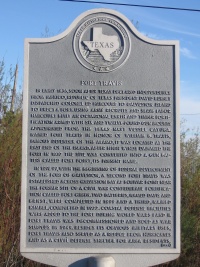The Bolivar Peninsula
has a long history of fortifications. Many of them
were built on the site of the present Fort Travis
Seashore Park. In 1816, Frances Xavier Mina, while on
an expedition for Spain, constructed an earthen levee
to protect himself and his men from the Karankawa
Indians.
In 1818, Dr. James Long, his wife, Jane (a beautiful
former debutante from Natchez, Mississippi) and 300
troops came to Texas to free Texas from Spain. Dr Long
established his base of operations at Port Bolivar in
1820. He wished to secure the services of Jean Lafitte
who occupied Galveston Island. Lafitte would not help.
He had given verbal allegiance to Spain, Mexico, and
the United States, but carefully remained aloof from
entanglements that might curtail his privateering
enterprises. Finally, without aid from any source, Dr.
Long and his men set out to capture Presidio La Bahia.
Long left Jane, their daughter, and a maid at the rude
fort with a few men to protect them. The winter of
1821 was bitterly cold: the "protection" left. Jane
Long fired a cannon every morning to let Galveston
know the fort was still defended. But who was the
enemy? Was it the Spaniards, Mexicans, Lafitte's
pirates or the Karankawa Indians?
The Karankawas had a bad reputation that survives to
this day. They were a tall, nomadic people who refused
to be tamed. They kept mosquitos (and the rest of
society) at a distance by smearing their bodies with
alligator grease and fish oil. The stories of the
Karankawas being cannibals are not entirely accurate.
They did, at times, consume human flesh during special
ceremonies, but not as a regular practice.
During the time she was defending the fort. Jane, age
20, was expecting the birth of her third child, In
December, during a raging storm, the food ran out, the
slave girl became delirious from an illness and Jane
delivered her own child. The baby was named Mary and
was the first baby of English descent to be born in
Texas.
Because of her heroism, Jane Long is often called "The
Mother of Texas". Jane refused to leave until the
following July when she received word that her husband
had been killed. She later ran a rooming house in
Richmond. During the Civil War the fortification on
Bolivar Point was Fort Green -- for the Confederate
soldiers.
In 1898, along with federal development of the Port of
Galveston, construction on the present Fort Travis was
begun. The fort was completed in 1899. The fort was
heavily damaged during the 1900 storm. Repairs
included the present 15 foot sea wall around the fort.
During World War I Fort Travis garrisoned troops
defending the Port of Galveston and its approaches.
In 1942, the fort was enlarged and 2,500 troops were
stationed there. Several sizes of guns were installed,
from anti-aircraft up to 16 inch long range rifles.
When the war ended, Fort Travis was declared surplus
property, dismantled, and in 1949 sold to private
interests. The 60 acre park was acquired through a
Moody Foundation grant in 1976 and is operated by the
Galveston County Beach and Parks Department.
Today, the park includes the seawall, broad grassy
areas, oleanders, winding roads, well equipped play
grounds, picnic tables and bar-b-que grills.

click for larger view

